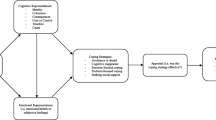Abstract
Data were collected from three samples using the Implicit Models of Illness Questionnaire (IMIQ) to assess illness representations as described in the self-regulation model of common sense illness representations. A factor structure was identified which displayed some similarities to the common sense model. This structure was used to examine illness representations of students and patients concerning three illnesses—rheumatoid arthritis (RA), multiple sclerosis (MS), and human immunodeficiency virus (HIV). Representations differed across illnesses and respondent status (patient vs. student). Students rate individuals as having more personal responsibility for RA or MS than did patients; moreover, the difference between patient/student ratings was greater with respect to MS than it was for RA. Patients were more aware of the variable nature of RA and MS symptoms than were students. This study demonstrates the value of the IMIQ as a tool for assessing illness cognitions and suggests that illness representations differ as a function of personal experience and personal relevance.
Similar content being viewed by others
References
Affleck, G., Pfeiffer, C., Tennen, H., and Fifield, J. (1987). Appraisals of control and predictability in adapting to a chronic disease.J. Person. Soc. Psychol. 53: 273–279.
Blalock, S. J., DeVellis, R. F., Brown, G. K., and Wallston, K. A. (1989). Validity of the center for epidemiological studies depression scale in arthritis populations.Arth. Rheum. 32: 991–997.
Bishop, G. D., Briede, C., Cavazos, L., Grotzinger, R., and McMahon, S. (1987). Processing illness information: The role of disease prototypes.Basic Appl. Soc. Psychol. 8: 21–44.
Genest, M. (1983). Coping with rheumatoid arthritis.Can. J. Behav. Sci. 14: 392–408.
Hampson, H. E., Glasgow, R. E., and Zeiss, A. M. (1994). Personal models of osteoarthritis and their relations to self-management activities and quality of life.J. Behav. Med. 17: 143–158.
Klonoff, E. A., and Landrine, H. (1994). Culture and gender diversity in commonsense beliefs about causes of six illnesses.J. Behav. Med. 17: 407–418.
Landrine, H., and Klonoff, E. A. (1994). Cultural diversity in causal attributions for illness: The role of the supernatural.J. Behav. Med. 17: 181–183.
Lau, R. R. (1982). Origins of health locus of control beliefs.J. Person. Soc. Psychol. 42(2): 322–334.
Lau, R. R., and Hartman, K. A. (1983). Common-sense representations of common illnesses.Health Psychol. 2: 167–185.
Lau, R. R., Bernard, T. M., and Hartman, K. A. (1989). Further explorations of common-sense representations of common illnesses.Health Psychol. 8(2): 195–219.
Meyer, D., Leventhal, H., and Gutmann. (1985). Common-sense models of illness: The example of hypertension.Health Psychol. 4(2): 115–135.
Meenan, R. F., Anderson, J. J., Kazis, L. E., Egger, M. J., et al. (1984). Outcome assessment in clinical trials: Evidence for the sensitivity of a health measure.Arth. Rheum. 27: 1344–1352.
Moulton, J. M., Sweet, D. M., Temoshok, L., and Mandel, J. S. (1987). Attributions of blame and responsibility in relation to distress and health behavior change in people with AIDS and AIDS-related complex.J. Appl. Soc. Psychol. 17(5): 493–506.
Nerenz, D. R., and Leventhal, H. (1983). Self-regulation theory in chronic illness. In Burish, T. G., and Bradley, L. A. (eds.),Coping with Chronic Disease, Academic Press, New York.
Parker, J., Frank, R., Beck, N., et al. (1988). Pain in rheumatoid arthritis: Relationship to demographic, medical, and psychological factors.J. Rheumatol. 15: 433–437.
Radloff, L. S. (1977). The CES-D scale: A self-report depression scale for research in the general population.Appl. Psychol. Measure. 1: 385–401.
Schiaffino, K. M., and Revenson, T. A. (1992). The role of perceived self-efficacy, perceived control, and causal attributions in adaptation to rheumatoid arthritis: Distinguishing mediator vs. moderator effects.Person. Soc. Psychol. Bull. 18: 709–718.
Schiaffino, K. M., and Revenson, T. A. (1995). Why me? The persistence of positive and negative appraisals over the course of illness.J. Appl. Soc. Psychol. 25: 601–618.
Schiaffino, K. M., Revenson, T. A., and Gibofsky, A. (1992). Assessing the impact of self-efficacy beliefs on adaptation to rheumatoid arthritis.Arth. Care Res. 4: 150–157.
Schumacher, H. R. (ed.) (1988).Primer on the Rheumatic Diseases, 9th ed., Arthritis Foundation, Atlanta, GA.
Strickland, B. R. (1989). Internal-external control expectancies: From contingency to creativity.Am. Psychol. 4: 1–12.
Smith, C. A., and Wallston, K. A. (1992). Adaptation in patients with chronic rheumatoid arthritis: Application of a general model.Health Psychol. 11: 151–162.
Taylor, S. E., and Brown, J. D. (1988). Illusion and well-being: A social-psychological perspective on mental health.Psychol. Bull. 103: 193–210.
Turk, D. C., Rudy, T. E., and Salovey, P. (1986). Implicit models of illness.J. Behav. Med. 9: 453–474.
Wallston, K. A., Wallston, B. S., and DeVellis, R. (1978). Development of the multidimensional health locus of control (MHLC) scales.Health Educ. Monogr. 6: 160–170.
Wallston, K. A., Smith, R. A., King, J. E., Forsber, P. R., Wallston, B. S., and Nagy, V. T.. (1983). Expectancies about control over health: Relationship to desire for control of health care.Person. Soc. Psychol. Bull. 9: 377–385.
Author information
Authors and Affiliations
Additional information
The study presented here was supported by an Arthritis Foundation Traineeship Grant to the first author and grants from the National Institute of Health (AM36679) and the Professional Staff Congress—CUNY to Tracey A. Revenson and by a grant to the first author from Fordham University.
Rights and permissions
About this article
Cite this article
Schiaffino, K.M., Cea, C.D. Assessing chronic illness representations: The implicit models of illness questionnaire. J Behav Med 18, 531–548 (1995). https://doi.org/10.1007/BF01857894
Accepted:
Issue Date:
DOI: https://doi.org/10.1007/BF01857894




